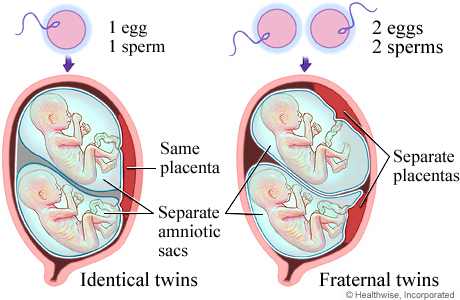
Identical twins come from a single egg that has been fertilized by one sperm. For unknown reasons, the fertilized egg splits into two embryos during the first stage of development. In the uterus, most identical twins share the same placenta. (They get oxygen and nutrients and get rid of wastes through the placenta.) But they usually grow within separate amniotic sacs. In rare cases, identical twins share one amniotic sac.
Fraternal twins develop when two eggs are fertilized by two separate sperms. The fetuses have separate placentas and amniotic sacs.
Current as of: July 15, 2025
Author: Ignite Healthwise, LLC Staff
Clinical Review Board
All Ignite Healthwise, LLC education is reviewed by a team that includes physicians, nurses, advanced practitioners, registered dieticians, and other healthcare professionals.
Current as of: July 15, 2025